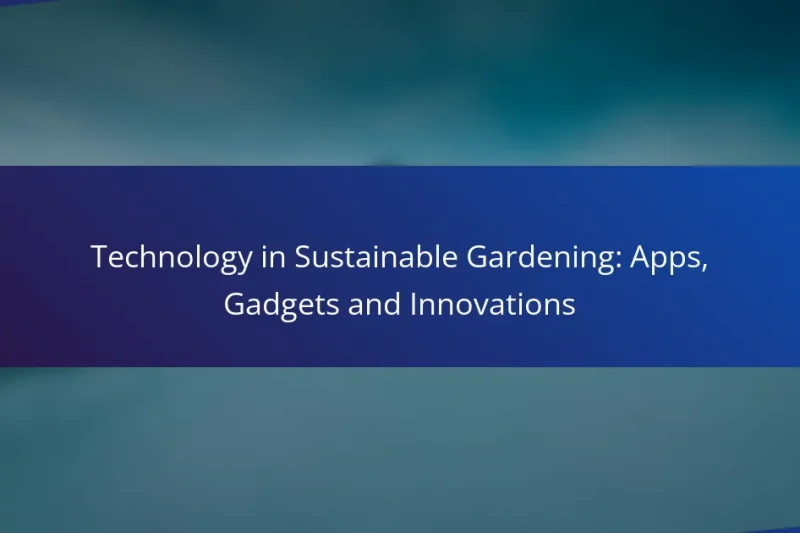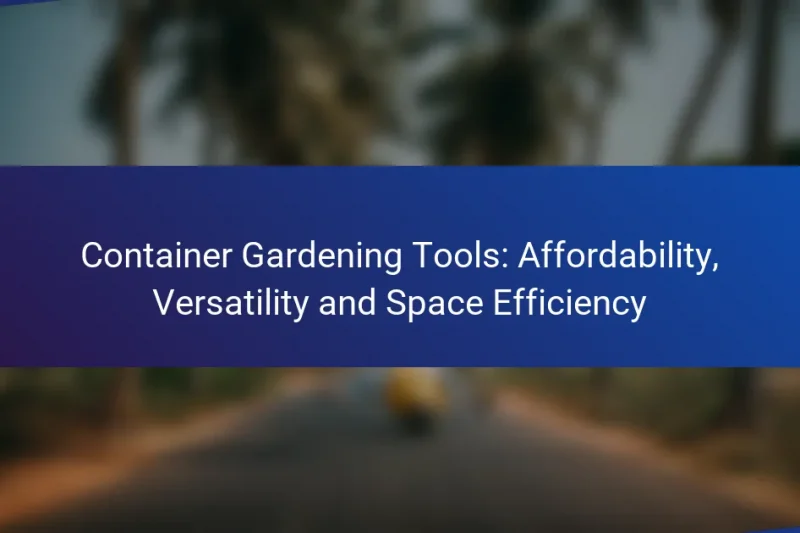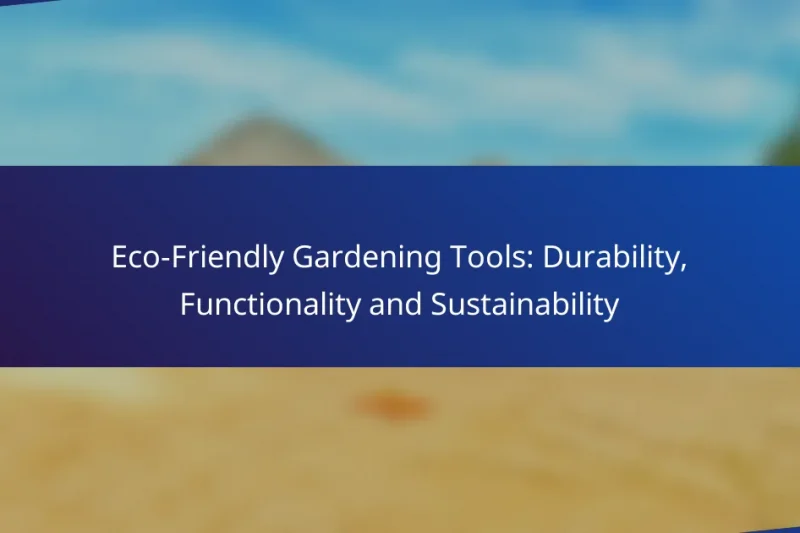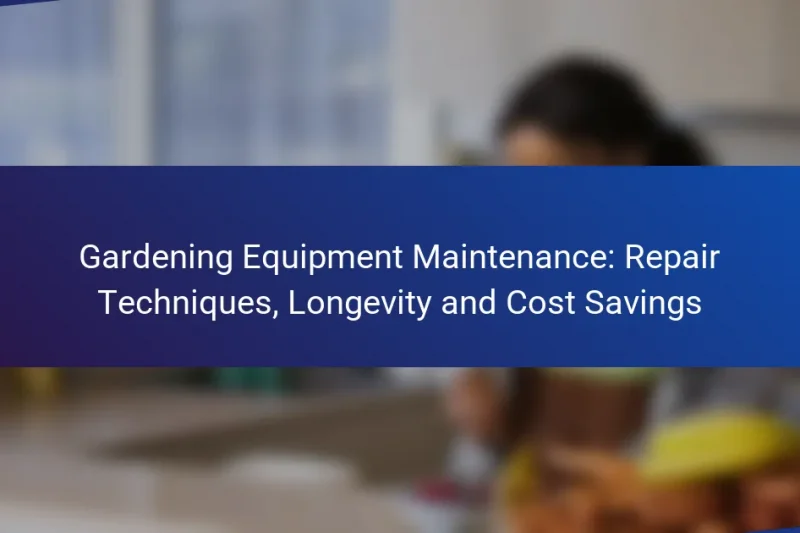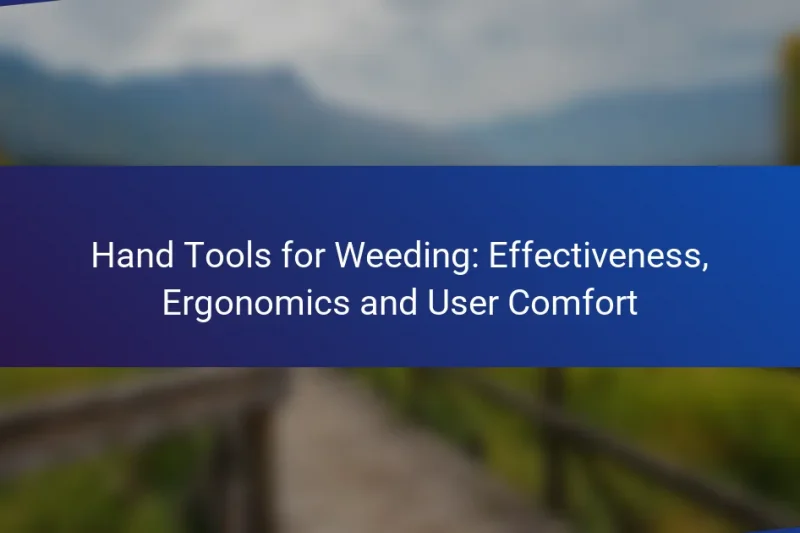Technology plays a crucial role in advancing sustainable gardening, particularly in urban environments where space and … Technology in Sustainable Gardening: Apps, Gadgets and InnovationsRead more
Sustainable Gardening: Tools and Equipment
Sustainable gardening tools and equipment play a crucial role in creating an eco-friendly garden while enhancing efficiency. By selecting tools made from recycled materials, utilizing solar power, and incorporating compost bins, gardeners can minimize their environmental impact. These choices not only promote healthier soil and ecosystems but also lead to long-term cost savings and improved gardening outcomes.
Electric vs Manual Gardening Tools: Efficiency, Cost and Space Suitability
When choosing between electric and manual gardening tools, efficiency, cost, and space suitability are key considerations. … Electric vs Manual Gardening Tools: Efficiency, Cost and Space SuitabilityRead more
Minimalist Gardening Toolkit: Essentials, Space-Saving and Cost-Effectiveness
Minimalist gardening emphasizes the use of essential tools that enhance functionality and efficiency, allowing gardeners to … Minimalist Gardening Toolkit: Essentials, Space-Saving and Cost-EffectivenessRead more
Container Gardening Tools: Affordability, Versatility and Space Efficiency
Container gardening tools are essential for maximizing your gardening experience while ensuring affordability and versatility. These … Container Gardening Tools: Affordability, Versatility and Space EfficiencyRead more
Eco-Friendly Gardening Tools: Durability, Functionality and Sustainability
Eco-friendly gardening tools are designed to provide durability, functionality, and sustainability, making them an excellent choice … Eco-Friendly Gardening Tools: Durability, Functionality and SustainabilityRead more
Gardening Equipment Maintenance: Repair Techniques, Longevity and Cost Savings
Maintaining your gardening equipment is essential for ensuring its longevity and optimal performance. By implementing regular … Gardening Equipment Maintenance: Repair Techniques, Longevity and Cost SavingsRead more
Hand Tools for Weeding: Effectiveness, Ergonomics and User Comfort
Hand tools for weeding are essential for effective garden maintenance, allowing for precise removal of unwanted … Hand Tools for Weeding: Effectiveness, Ergonomics and User ComfortRead more
What are the best tools for sustainable gardening?
The best tools for sustainable gardening focus on minimizing environmental impact while maximizing efficiency. Key options include solar-powered tools, compost bins, and hand tools made from recycled materials, all designed to support eco-friendly gardening practices.
Solar-powered garden tools
Solar-powered garden tools harness renewable energy to operate, reducing reliance on electricity and fossil fuels. These tools, such as solar-powered lawn mowers and trimmers, are efficient and can significantly lower energy costs over time.
When selecting solar-powered tools, consider the battery life and charging time. Look for models with high-capacity batteries that can run for extended periods, ensuring you can complete your gardening tasks without frequent recharges.
Compost bins
Compost bins are essential for sustainable gardening, allowing you to recycle kitchen scraps and yard waste into nutrient-rich compost. This not only reduces landfill waste but also enriches the soil, promoting healthy plant growth.
Choose a compost bin that suits your space and needs. Options range from small, enclosed bins for urban gardens to larger, open bins for rural settings. Ensure proper aeration and moisture levels to facilitate efficient composting.
Hand tools made from recycled materials
Hand tools made from recycled materials, such as shovels, rakes, and trowels, are eco-friendly alternatives that help reduce waste. These tools often perform just as well as traditional options while supporting a circular economy.
When purchasing, look for brands that prioritize sustainability and transparency in their manufacturing processes. Investing in durable, recycled tools can save money in the long run and contribute to a greener planet.
Rainwater collection systems
Rainwater collection systems capture and store rainwater for irrigation, reducing reliance on municipal water supplies. These systems can be as simple as a rain barrel or as complex as a full rainwater harvesting setup.
To implement a rainwater collection system, ensure your setup complies with local regulations regarding water collection. Choose a location that maximizes runoff from roofs and install a filtration system to keep the water clean for gardening use.
Organic pest control equipment
Organic pest control equipment includes tools and products designed to manage pests without synthetic chemicals. Options range from insect traps to natural repellents, promoting a healthier garden ecosystem.
When selecting organic pest control methods, consider the specific pests you are dealing with and choose targeted solutions. Regular monitoring and integrated pest management practices can help maintain a balanced garden environment while minimizing harm to beneficial insects.
How to choose sustainable gardening equipment?
Choosing sustainable gardening equipment involves selecting tools that minimize environmental impact while maximizing efficiency and effectiveness. Focus on materials, energy use, and durability to ensure your gardening practices are eco-friendly.
Evaluate material sustainability
When assessing material sustainability, prioritize tools made from renewable, recycled, or biodegradable materials. For instance, bamboo handles are a great alternative to plastic, as they are strong and environmentally friendly.
Look for certifications such as FSC (Forest Stewardship Council) for wooden tools, which indicate responsible sourcing. Avoid products with harmful chemicals or non-recyclable components to reduce your ecological footprint.
Consider energy efficiency
Energy-efficient tools can significantly reduce your gardening’s carbon footprint. Opt for manual tools when possible, as they require no electricity and often provide better exercise.
If using powered equipment, choose battery-operated or electric tools with energy-saving features. Check for energy ratings and select models that consume less power while delivering the necessary performance.
Assess durability and lifespan
Durability is crucial for sustainable gardening equipment, as longer-lasting tools reduce waste and the need for replacements. Look for products with warranties or those made from high-quality materials that withstand wear and tear.
Consider the lifespan of tools before purchasing; investing in higher-quality items may be more cost-effective over time. Regular maintenance can also extend the life of your equipment, ensuring it remains functional and efficient.
What are the benefits of using sustainable gardening tools?
Using sustainable gardening tools offers numerous advantages, including reduced environmental impact, improved soil health, and long-term cost savings. These tools are designed to minimize harm to the ecosystem while promoting a healthier garden environment.
Reduced environmental impact
Sustainable gardening tools are crafted from eco-friendly materials and designed to minimize waste. For example, tools made from recycled metals or sustainably sourced wood help reduce resource depletion and pollution.
Additionally, many sustainable tools are built to last longer than conventional options, which decreases the frequency of replacements and further lessens environmental strain. Choosing tools that require less energy to manufacture and operate can significantly lower your carbon footprint.
Improved soil health
Using sustainable tools often promotes better soil health through practices like no-till gardening and organic amendments. Tools designed for aeration or composting help maintain soil structure and fertility, which is essential for plant growth.
For instance, a high-quality compost fork can improve nutrient distribution in the soil, while a broadfork allows for deep aeration without disturbing the soil layers. This leads to healthier plants and a more resilient garden ecosystem.
Cost savings over time
Investing in sustainable gardening tools can lead to significant cost savings over the long run. Although the initial purchase price may be higher, durable tools often require fewer replacements and repairs, resulting in lower overall costs.
Moreover, sustainable practices can reduce the need for chemical fertilizers and pesticides, which can be expensive. By enhancing soil health and promoting biodiversity, these tools can lead to a more productive garden, ultimately saving money on inputs and increasing yields.
Where to buy sustainable gardening tools in the US?
Sustainable gardening tools can be found at various locations across the US, catering to eco-conscious gardeners. Consider local garden centers, online retailers, and farmers’ markets for a range of options that support sustainability.
Local garden centers
Local garden centers often carry a selection of sustainable gardening tools, including hand tools made from recycled materials and organic gardening supplies. Shopping at these centers not only supports local businesses but also allows you to ask staff for advice on eco-friendly practices.
When visiting a local garden center, look for certifications or labels indicating sustainable practices, such as tools made from sustainably sourced wood or biodegradable materials. This ensures that your gardening efforts align with environmental goals.
Online retailers like EcoGardener
Online retailers, such as EcoGardener, specialize in sustainable gardening tools and equipment, offering a wide variety of products that may not be available locally. These platforms often provide detailed product descriptions, customer reviews, and comparisons to help you make informed choices.
When purchasing online, check for shipping policies and eco-friendly packaging options. Many retailers emphasize sustainability not just in their products but also in their shipping practices, which can further reduce your environmental impact.
Farmers’ markets
Farmers’ markets can be a great source for sustainable gardening tools, often featuring local artisans who create handmade items from eco-friendly materials. These markets may offer unique tools that are not mass-produced, providing a personal touch to your gardening experience.
While at a farmers’ market, take the opportunity to connect with vendors who can share their knowledge about sustainable gardening practices. This can enhance your understanding and help you choose tools that best fit your gardening style and environmental values.
What are the prerequisites for starting a sustainable garden?
Starting a sustainable garden requires understanding your local environment and preparing your soil properly. These prerequisites ensure that your garden thrives while minimizing environmental impact.
Understanding local climate conditions
Local climate conditions play a crucial role in sustainable gardening. Factors such as temperature, rainfall, and seasonal changes influence what plants will thrive in your area.
To assess your climate, consider using resources like the USDA Plant Hardiness Zone Map, which categorizes regions based on average annual minimum temperatures. This can help you select plants that are well-suited to your environment.
Additionally, observe microclimates in your garden, such as shaded areas or spots with full sun, as these can affect plant growth and water needs.
Soil testing and preparation
Soil testing is essential for understanding the nutrient content and pH level of your garden soil. A simple soil test kit can help you determine what amendments may be necessary to create a healthy growing environment.
Once you have your soil tested, focus on improving its structure and fertility. Incorporating organic matter, such as compost or well-rotted manure, can enhance soil health and promote beneficial microbial activity.
Remember to avoid using chemical fertilizers and pesticides, as they can harm the ecosystem. Instead, consider natural alternatives like crop rotation and companion planting to maintain soil fertility and pest control.
